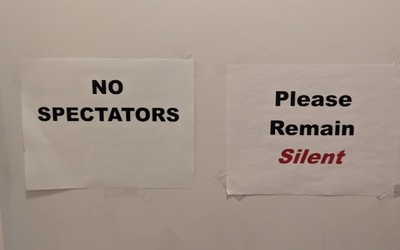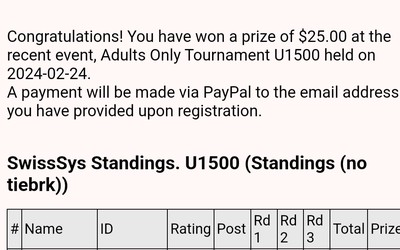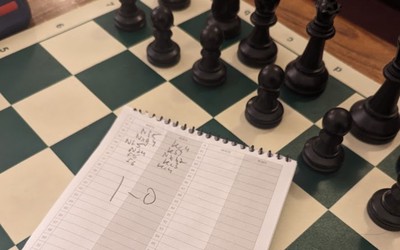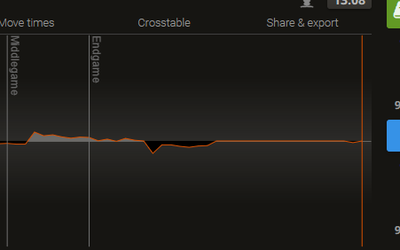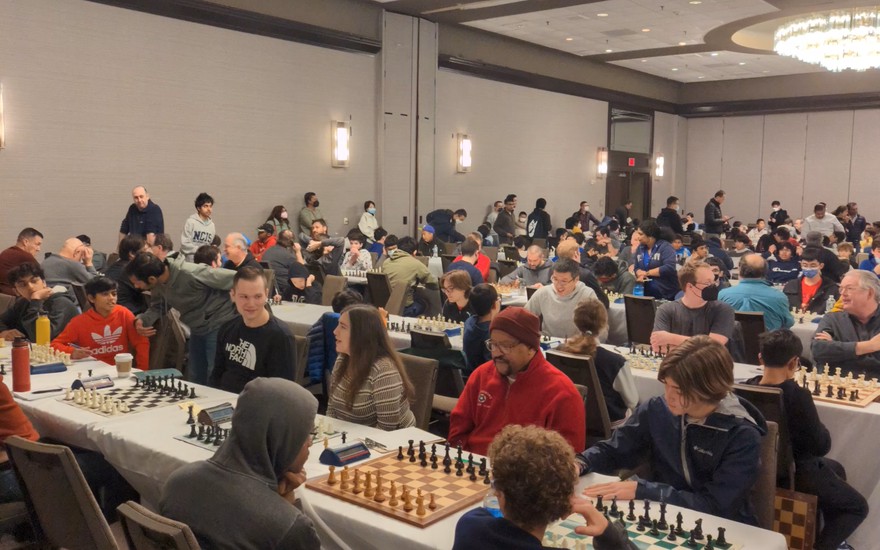
Noah Zucker, 2022
Eastern Chess Congress 2022 Recap
Maybe I'm getting the hang of this...?Last week I attended the Eastern Chess Congress, 2022 edition, in Princeton, NJ. I played in the U1300 section and finished with a score of 3 / 5 with 1 loss, 2 wins and 2 draws. Here is a recap of the games.
https://chessevents.com/event/easternchesscongress/2022/standings/13
I played the 3 day schedule with all games 40/80, s.d. 30, +30 time controls.
Game 1 vs Chang
Summary: I got caught up in "preparation" and "castle-opposite side!" without looking at what was happening on the board. I spent a bit too much time studying IM Andras Toth's "Beginner e4 preparation" in the past few weeks, and so when Black played the Modern Defense, I got caught up in trying to execute a plan from that repertoire instead of playing principled opening moves.
After the tournament, I watched a bit of "Chess Mistakes and How to Avoid Them" by GM Evgenij Miroshnichenko which very much reflects what happened in my game - I was playing to an opening idea rather than watching what was happening on the board.
https://www.youtube.com/watch?v=cPr0hNjvjNA
In any case, I actually had several winning chances during the game that I missed, including a crushing end game. A big part of playing chess is taking a deep breath and looking at the board with a fresh pair of eyes - rather than getting caught up with invasive thoughts like "I"m winning" "I'm losing" "I need some counter-play" etc.
Missed a winning chance after 40. ... h5??
Game 2 vs Birudavolu
I had black and played the Russian Defense (aka Petrov). These days as black against e4 I play either Russian or French depending on my mood, but I suspect that I should favor the Russian against scholastic players as it blunts their early attacks on f7 and leads to an endgame (they are not great at endgames).
In this game I played more cautiously, and felt pretty good about my endgame chances given white's pawn structure was not ideal. After some maneuvering in the endgame, we agreed to a draw.
Unfortunately, I missed a clear win here as I had a crushing move after 38. Rd3 ... Can you spot it?
Game 3 vs Bunting
All I can say about this game is that my opponent had an absolutely crushing attack on my king and I somehow swindled a victory. Rather than moving in, and investing material for tempo and mating opportunities, he kept defending my (innocuous) counter-threats until he lost his chance. I was puzzled, to be honest.
Apparently, black played the French Defense "Normal Variation," which was completely outside my opening preparation. This time, I just tried to play principled moves and not castle into an attack (although that kind of failed).
Can you spot black's move after 34. Qxg4 ... ?
Game 4 vs Bartlett
Black in this game, I played a French Winawer... bungling it up immediately (note to self: just the capture the knight!). However, instead of blundering my queen, I managed to exit the opening up a full piece? Such is life in the U1300 section!
Of course, as is typical for scholastic players, white refused to surrender and pressed a counter attack immediately, leading to 2 knights vs. rook endgame and a draw after 48 moves. Of course, chances were missed on both sides, including a crushing endgame position by white that he failed to convert.
Somehow I got a draw out of this completely lost position??
Game 5 vs Yang
I again played the French Defense, and again found myself up a full piece out of the opening. Unlike the last game, I carefully built upon this advantage and ultimately checkmated my opponent after 44 moves.
(NOTE: all around me older players were resigning left and right merely for being down a piece early in the game. I don't understand not just playing it out. "There's always time for them to blunder" - Ben Finegold)
Happily, post-game engine analysis shows I played with 94% accuracy (no blunders after I won black's bishop).
"Kindergarten tactics," as IM Andras Toth would say, won the game early:
Theoretical Record
Game 1: Could have won. Lost.
Game 2: Could have won. Draw.
Game 3: Should have lost: Won.
Game 4: Should have lost (queen could have been trapped), but also should have won (was up a full piece): Draw.
Game 5: Should win - did win.
Theoretically, I could have finished 3.5 / 5, if I had played more carefully / converted winning chances. In none of the games did my opponent completely overpower me. U1300 was probably the right section for me at the event.
Conclusions
Some take-aways from this experience and these games:
- STOP and I mean STOP thinking about "preparation" during the opening. If you recognize a line - sure - but otherwise play for the tactics on the board NOT some "opening idea."
- Before castling, check and then double-check if there is a potential attack on that side. Better yet, don't castle until development is finished.
- Speaking of development, play principled moves rather than looking for early attacks / tactics. Just develop safely and castle (unless your opponent presents a winning opportunity).
- DON'T play Qa5 as black to "back up" a bishop pin. Unless you're playing a known line, you're more likely to get your queen trapped.
- Keep studying endgame, because several of these games ended up there and you had winning chances.

